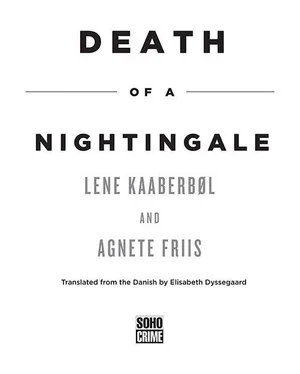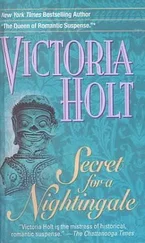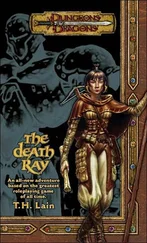Lene Kaaberbol - Death of a Nightingale
Здесь есть возможность читать онлайн «Lene Kaaberbol - Death of a Nightingale» весь текст электронной книги совершенно бесплатно (целиком полную версию без сокращений). В некоторых случаях можно слушать аудио, скачать через торрент в формате fb2 и присутствует краткое содержание. Год выпуска: 2013, ISBN: 2013, Издательство: Soho Crime, Жанр: Старинная литература, на английском языке. Описание произведения, (предисловие) а так же отзывы посетителей доступны на портале библиотеки ЛибКат.
- Название:Death of a Nightingale
- Автор:
- Издательство:Soho Crime
- Жанр:
- Год:2013
- ISBN:1616953047
- Рейтинг книги:5 / 5. Голосов: 1
-
Избранное:Добавить в избранное
- Отзывы:
-
Ваша оценка:
- 100
- 1
- 2
- 3
- 4
- 5
Death of a Nightingale: краткое содержание, описание и аннотация
Предлагаем к чтению аннотацию, описание, краткое содержание или предисловие (зависит от того, что написал сам автор книги «Death of a Nightingale»). Если вы не нашли необходимую информацию о книге — напишите в комментариях, мы постараемся отыскать её.
Death of a Nightingale — читать онлайн бесплатно полную книгу (весь текст) целиком
Ниже представлен текст книги, разбитый по страницам. Система сохранения места последней прочитанной страницы, позволяет с удобством читать онлайн бесплатно книгу «Death of a Nightingale», без необходимости каждый раз заново искать на чём Вы остановились. Поставьте закладку, и сможете в любой момент перейти на страницу, на которой закончили чтение.
Интервал:
Закладка:
“You better watch out for yourself,” whispered Jana. “Your father may be a class enemy, Olga, but your traitor sister has blood on her hands now. Her own family’s blood. If I were you, I would watch my back around her.”
Natasha pulled her coat closer to her body and glanced at her watch. It was almost eleven, and she had been sitting on the steps here for an hour and a half already, but she didn’t dare leave now. Not even to find a place to pee, though it was starting to feel pretty urgent. If she left … if she as much as looked away for a moment …
She had found the street; she was sure this was it. The little corner store, the miserable-looking birch trees along Jagtvejen’s median strip. It was here. But the houses looked more alike than she had remembered. The same worn red-brick fronts, the same anonymous brown doors. There was no ugly yellow car parked on the street, and she had looked at all the intercoms without finding Nina’s name. But sooner or later they had to come out, Nina or the husband or the children, and then she could ask. Then she would make them tell her where Katerina was.
She had pulled the hood of Robbie’s grey sweatshirt over her head in order not to be recognized. It would have been better to sit in the Audi, but cars lined the street bumper to bumper, and she had had to park elsewhere. What would they think, the Danes inside their apartments, if they looked out their windows and saw her now? Would they think that she was homeless, like one of those people who periodically froze to death during Kiev’s cold winters in a stairwell like the one she was huddling in now?
She had been surprised that there were also homeless people in Denmark. More, it seemed, than in Kiev. But maybe that was because there were fewer police. In Copenhagen there weren’t two policemen on every other corner. Here people could camp out in peace and quiet with their bags and packs and cardboard to sit on. Was that what she looked like? She was beginning to smell that way, that was for sure.
BEAUTIFUL, BEAUTIFUL NATASHA.
That was her, and of course that was what Pavel had fallen for, even though he said back then that it was her eyes and her smile, quite simply her that he had fallen in love with.
He spoiled her and treated her like a lady. He brought her to the expensive stores in the mall under Independence Square and discussed what suited her best with the salespeople while Natasha stood there without saying anything, because if she opened her mouth, they would be able to tell that she wasn’t from Kiev. The clothes were different from the ones she would have bought herself. Narrow skirts that reached her knees. Soft silk blouses and white shirts and glittering bracelets, wide belts and high-heeled shoes. Classic, he said, because Natasha was a “classic beauty.” He said the same thing to the hairdresser, who apparently felt duty bound to tell her how much eyeliner and mascara it was appropriate to use in Kiev. What she was wearing was too much and too cheap, and had a tendency to clump on the lashes. And the lipstick should not be pink and glossy.
“You’re not in Donetsk any longer, honey,” the lady had said and told her about Dior and Elizabeth Arden and other companies she had never heard of. Then she had cut Natasha’s hair shorter than she’d ever had it before, to her shoulders, and with new sharp angles and waves. The color was fine as it was—like a Ukrainian wheat field, with touches of brown and gold.
“From now on, you need to come see me every third week, honey. Or there’ll be trouble. Hair like yours can look like a million dollars if you take care of it.”
Pavel kissed the new hair and new color on her lips and said that she was completely perfect.
Only much later did she realize that he also loved her for her ignorance—all the things she didn’t know about him, about the world. He loved her because she was beautiful and dumb, because she was seventeen and came from Kurakhovo. A woman from Kiev, a woman his own age, would have asked more questions. Natasha didn’t question. She only loved. She loved him, she loved the apartment, she loved that he went to work every day and wrote in the newspapers about important topics and spoke with important people.
She kept the apartment so clean that everything shone. She changed the sheets every day, like in a hotel. And she cooked the way he wanted her to. Traditional, he called it. Beautiful braided paska bread for the holidays, borscht, cabbage rolls and little pancakes with fried farmers’ cheese, honey and sour cream, jam or apple sauce. In return he took care of her. She didn’t need to work in a dirty factory or stand in the unemployment line. Katerina was born in a private hospital with brilliant white towels in the bathroom; a drip of clear anesthesia was inserted into Natasha’s spine and took away all pain and worries. To Natasha, that had been the final proof back then that her life really was a fairy tale, so far removed from those girls from Kurakhovo, who, in the coming years, would be lying on rusty hospital beds with dirty covers, bellowing like cows as they brought their children into the world in a flood of shit and blood and torn placenta.
Pavel held her hand through every single contraction, because that was what men did in Kiev, at least the educated ones. And when Katerina finally lay in her arms, Pavel looked at her with so much tenderness that it was almost more than she could bear.
Beautiful, beautiful, stupid Natasha.
She didn’t know it then, but she had learned it now.
In this world, you were punished for your stupidity, and you were punished hard. That was just as true in Copenhagen as it was in Kiev.
IT WAS COLDsitting on the steps, but it still felt more natural than standing. She would have liked to have a smoke, a refugee habit she had picked up in the camp and which had intensified in prison. Cigarettes were fantastic props during life in captivity because they gave you the feeling that you were doing something other than just waiting. You pulled smoke into your lungs and blew it out again, and you turned the cigarette in your hand and looked at it while it got smaller and smaller.
A door opened, and for a brief moment, Natasha thought she saw Nina’s slender figure step out onto the sidewalk. It was the same impatient toss of the head, the same quivering energy in the body, but it was still wrong. This was not a woman but a girl in skinny jeans, basketball sneakers and a heavy leather jacket. A boy followed in a baggy ski jacket and an eye-catching black mustache taped to his upper lip. And then finally a man that Natasha recognized with certainty as Nina’s husband, even though he somehow had become thinner and older looking—dark eyes and a broad jaw under a black cap. He was dressed like a teenager in worn pale jeans and a yellow down jacket. He must be forty, thought Natasha, but Danish men dressed like boys, not men.
Michael had been an exception, of course. He preferred classic shirts and dark pants and expensive jackets that had to be dry-cleaned and pressed and steamed, and somehow she always managed to get it wrong so that he got angry or irritated. Maybe her life would have looked completely different if she had met a boy-man like Nina’s husband instead. If someone like him had lived in the house next to Anna’s farm. Natasha doubted that Nina’s husband had ever touched the nurse in a way she didn’t like. If he had, Nina would probably have exited both the bedroom and the apartment and slammed the door behind her. That was a luxury Natasha had not been able to afford.
Nina’s husband, son and daughter walked toward her without noticing her. The boy wore lurid electric-blue pants and a pair of ludicrously oversized shoes that would barely stay on. Still, he had that energy in his feet which she recognized from the boys at home. He kicked stones, balanced on the curb and made small, energetic jumps to smack a flat hand against the traffic signs.
Читать дальшеИнтервал:
Закладка:
Похожие книги на «Death of a Nightingale»
Представляем Вашему вниманию похожие книги на «Death of a Nightingale» списком для выбора. Мы отобрали схожую по названию и смыслу литературу в надежде предоставить читателям больше вариантов отыскать новые, интересные, ещё непрочитанные произведения.
Обсуждение, отзывы о книге «Death of a Nightingale» и просто собственные мнения читателей. Оставьте ваши комментарии, напишите, что Вы думаете о произведении, его смысле или главных героях. Укажите что конкретно понравилось, а что нет, и почему Вы так считаете.










